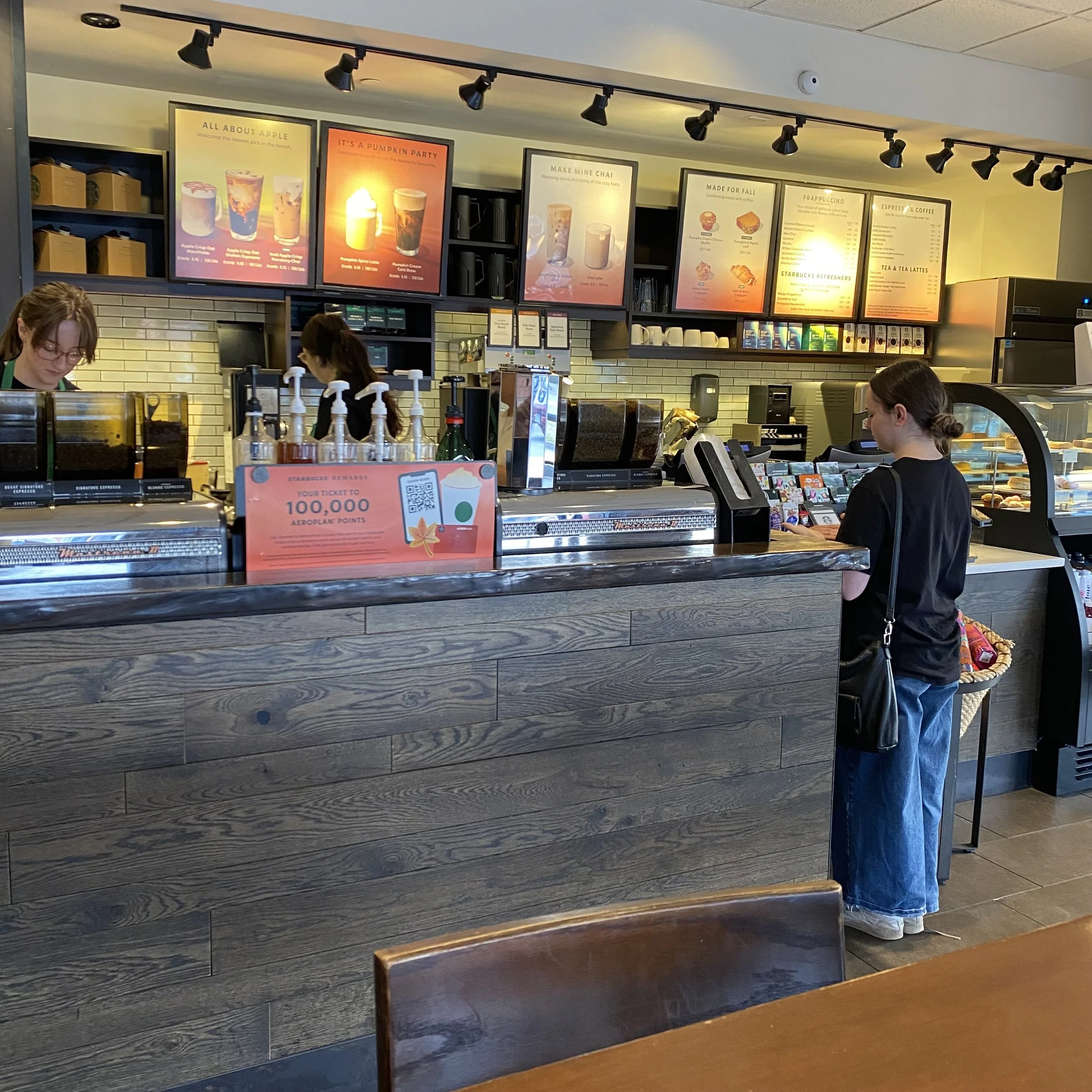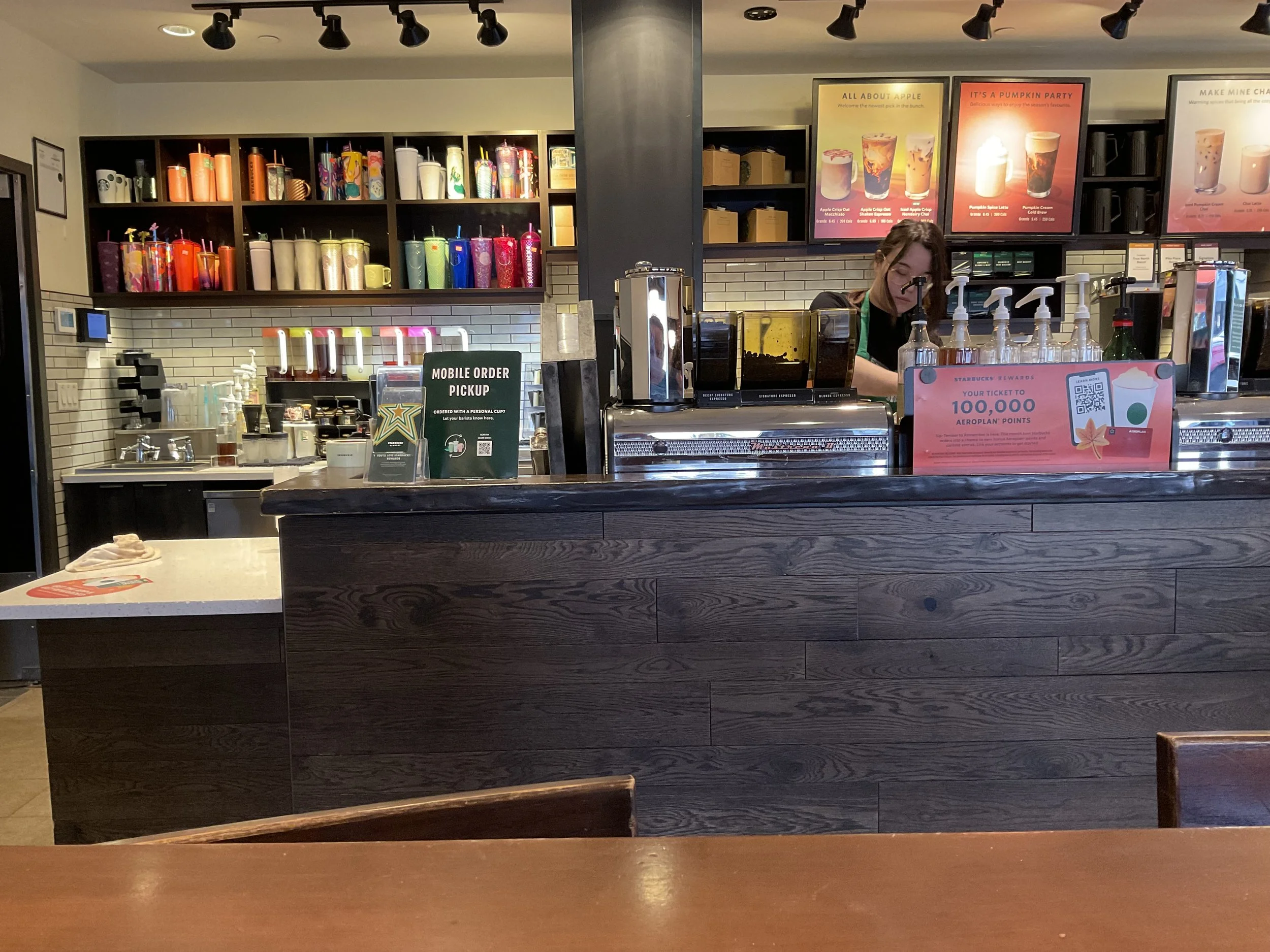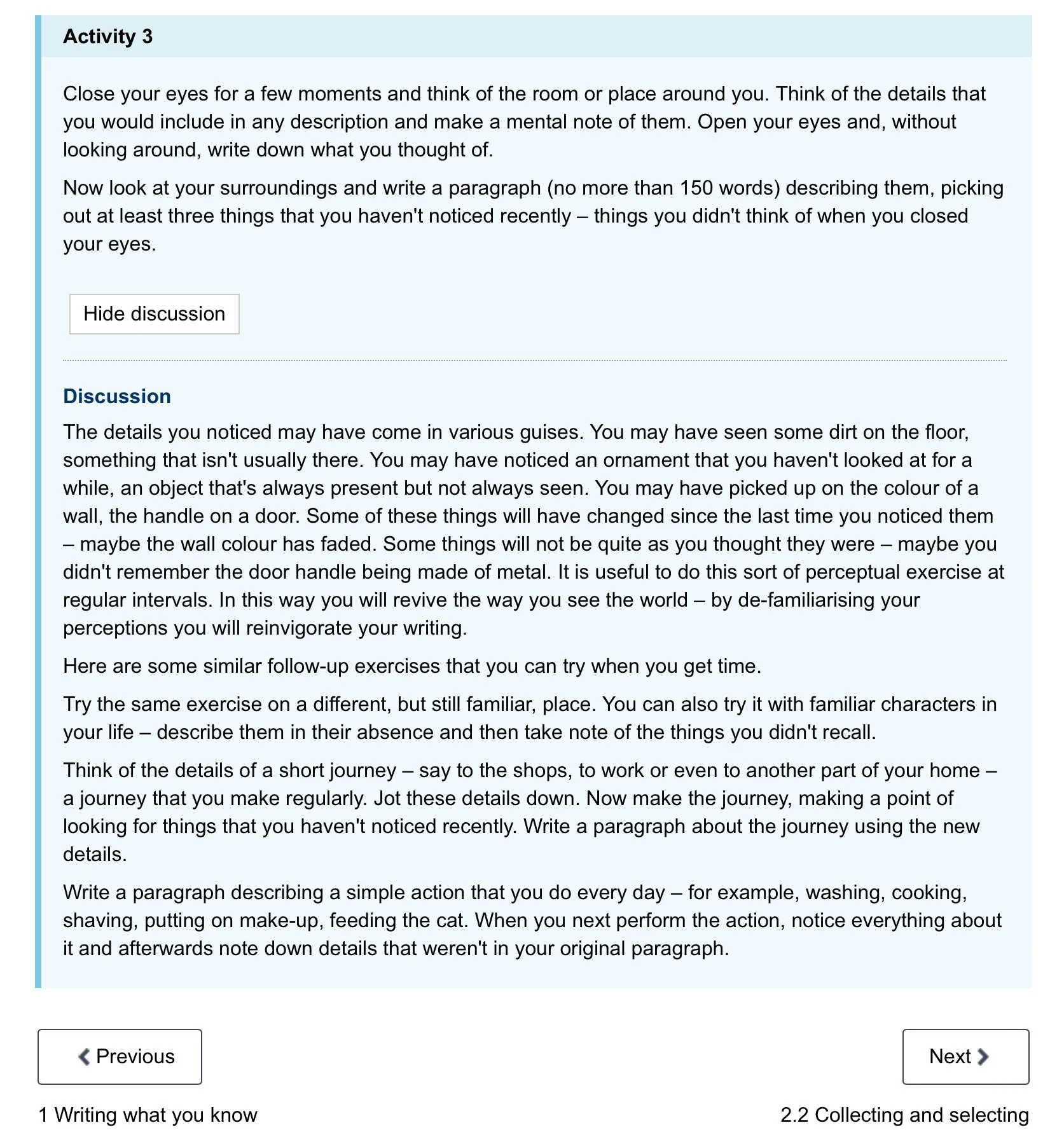2.1 Building a believable world
This section of the course explored the idea that writing is a perceptual art.
PERCEPTION > Wikipedia defines perception as “…the organization, identification, and interpretation of sensory information in order to represent and understand the presented information or environment.” Writers use words to describe what they perceive, and from this a reader makes meaning from the words that they read.
A good writer must be alert, mindful, and aware of the world around them.
AWARENESS > Wikipedia notes how awareness: “…is a relative concept. It may refer to an internal state, such as a visceral feeling, or on external events by way of sensory perception. It is analogous to sensing something, a process distinguished from observing and perceiving (which involves a basic process of acquainting with the items we perceive). Awareness can be described as something that occurs when the brain is activated in certain ways, such as when the color red is seen once the retina is stimulated by light waves. This conceptualization is posited due to the difficulty in developing an analytic definition of awareness or sensory awareness.” M-W notes that to be aware is to “…have or show realization, perception, or knowledge”
ALERT > M-W describes alertness as a “…state of careful watching and readiness especially for danger or opportunity”
BE AWARE > THROUGH OUR SENSES TO what’s happening in the world around us.
Move beyond being stuck in the habit and routine of the day, look at these with our senses to help build a believable world for readers to explore.
Activity 3
Close your eyes for a few moments and think of the room or place around you. Think of the details that you would include in any description and make a mental note of them. Open your eyes and, without looking around, write down what you thought of.
My eyes closed, I can hear the spray of warm myst escaping from the steam wand a barista is using to make a latte or some other hot drink. As the milk gets hotter, it feels as though the pitch of the steam aerating the liquid gets ever so higher until the barista sharply shuts it off. I can hear another machine blending the ice and cream together to possibly create a Frappuccino. I hear the muffled voice of a woman placing an order to another barista who repeats it back to her. The other sounds of the cafe are just loud enough to make their discussion unintelligible to me. A rather mellow song is playing overhead, filling the gaps left between the noises of the operational cafe. I open my eyes briefly to open Shazam on my iPhone and it tells me the song is by Melpo Mene, called Ain’t Gonna Die While Sitting Down. I close my eyes again, reaching for a warm chocolate chip cookie that lays in a small white Starbucks takeaway bag. I feel the paper of the bag on the back of my hand, it’s smooth and warm. I feel the cookie between my fingers, as I break off a part of it, letting my hand carry it up to my mouth. My teeth bite down on part of it, I feel the warm chocolate on my tongue, as my tongue pushes the warm crumbly softly sweet texture of this teeth to the roof of my mouth, feeling it start to break apart as I begin to chew. I feel the hard plastic keys of the keyboard that’s connected to my iPad, the bumps above the ‘F’ and ‘J’ keys always feel slightly off. My hands aren’t raised in the air as they should be: most of my palm and wrists are resting lazily on the hard wood of the raised table I’m sitting at, my legs dangling from the high rise chair.
ARTIFACT 01 > Steven Lee. “Inside a Starbucks Writing 18:57. (2/2).” 01 Sep 2024.
Now look at your surroundings and write a paragraph (no more than 150 words) describing them, picking out at least three things that you haven't noticed recently – things you didn't think of when you closed your eyes.
I open my eyes to find the room bathed in a warm orange glow of the sun that’s setting in the west, bleeding in through the very top of the cafe’s window. There’s a cool breeze from the cafe’s air conditioning that brushes across my bare lower arms, it’s a sensation that moves up into my spine, sending the shiver of a chill down my back. It’s slowly getting darker outside, but it’s still daylight, a muffled, muted daylight, cloaked in a eerie shade as the sun slowly slips further away across the horizon, now behind several buildings and trees that block it’s rays, turning the room back into a more normal look. The people who were waiting for their orders are now gone, just another man sits across from me at the other end of this long table we’re at. A new song is playing and I think he’s singing along. It’s another song I don’t know, but Shazam tells me that it’s called Conquer the Heart by Orville Peck & Nathaniel Rateliff. Another regular is making one last order to go as the cafe closes soon. I can hear him talk a little easier now that the cafe is less busy. He asks if she’s working tomorrow, and she says she is. Another barista has gone on her break, her apron removed, she walks over and sits across from the young man who had been singing along to Orville and Nathaniel. She’s eating something, but with my glasses off, I can’t quite make out what it is. He used to get Fridays off he says, and just isn’t used to working on Fridays again. The rest of their conversation is more muted and soft. I remember waiting for Jessie when she used to work at Rogers Arena, I remember waiting and watching for her to come out of the employee’s entrance, and then we’d head to get a bite to eat at some cafe or restaurant that was still open at eleven o’clock at night.
ARTIFACT 02 > Steven Lee. “Inside a Starbucks Writing 19:29 (2/2).” 01 Sep 2024.
2.2 Collecting and selecting
NOTEBOOKS > an essential tool for recording observations and accounts of daily events. Can be a place to record ideas for future writing - be it a short story, memoir, or poem. A notebook can be used to record and keep clippings from magazines and newspapers. You can record your thoughts about books or poetry you’ve read, as well as your thoughts about plays, performances, concerts, or movies you’ve seen, or songs you’ve heard. A NOTEBOOK is for you, by you, and it should contain whatever helps you or inspires your writing.
Awareness of your life is important, as a major source of potential material is your own life. What one sees, experiences, thinks, and feels. KEEP YOUR EYES OPEN. How are people dressed, colour co-ordinated clothes or messy garbled clashing? How do they act? Do you notice other people’s routines or habits? Tone of voice? Is someone alone or with others? How do they interact? Are they walking a pet, what’s the pet like? Friendly? Snarly? The weather? Character descriptions? Overheard conversations / turn of a phrase? Can record bullet points - things that will help you remember later. Perception is always selective, as we can’t record everything one sees. Nor can one record everything… but the things that one notices can be things one uses later on when writing. Sometimes, observations can almost form a narrative, or the fragment of something larger. Keep one’s ears open to - what are the acoustics of a room like (the loud hollow echo of a gymnasium)? How does a place smell (chlorine in a swimming pool)?
Shift ones judgment to curiosity. Mindfulness as a writer (Dinty W. Moore). Have an investigative attitude to one’s environment. Look at things from different angles, try to see what usually goes unnoticed by others or by yourself. When one looks at their notebooks later to work on a larger writing project, more selection will be made - a writer is always picking and choosing what to use. What to include and exclude. What details are important, what details feel repetitive. You might notice you didn’t collect enough information to begin with. If you visit the same place often, be open to the idea that places can change over time. What new things do you notice? It may seem banal or mundane but often things shift. Dr Neale’s course lecture noted how:
“It is these shifts in the way ou see your familiar world that revive it. In this way writing is a process of scrutinizing, looking closely at things, and then taking the observations onto a new level of perception, one in which you understand your world just a little more… Whether apparently insignificant or more focused, there is no prescription for the sort of observations you should make; they will always be personal to the individual writer.”
2.3 Using your observations
Dr. Neale wrote the following about using one’s observations in the last unit of this section:
“The observations you make in your notebook might not always appear imaginative or pertinent to anything, but the mundane recording of events may have unlikely uses. Writing in my notebook on 15 December 1998, I observed the sky – at the coast on a murky winter's day, when the low cloud seemed to be lit by a churning, subterranean force:
the earth comes to the surface, the soil muddies the sky, clouds the air – it even turns the sea into a sandy mix … the sea, the puddles, the rivers, the sky – all glow brown, glisten, shimmer – but not with the light of any sun.
On another occasion in the same notebook I observed a familiar river, and how the current flowed in ‘one concerted way in the straights but was torn between two directions at the bends’. By struggling to express what I saw on those two separate days, the observations stayed with me, largely because I had taken time to write about them. I later combined parts of these two descriptions in a scene of a novel, The Book of Guardians (Neale, 2012), using the river setting to reflect the inner state of my main character, Philip Eyre:
The swell of the river had caused the current to be perplexed, flowing concertedly in one midstream direction but torn between at least two, whirling between calm and rush, in the shallows and elbows. The rowing boat bobbed and turned uneasily like a gelding on its rope. The cigarette smoke smelt different – and I wondered whether it was because we were outdoors. Now it was fragrant, balmy even, like woodsmoke in the night.
It was one of those days: the earth rising to the surface, muddying the water, overflowing into the sky and air. The world was in spate. The earth appeared to be glimmering with the density of its own substrata.
(Neale, 2012)
What you put down in your notebook can act as a mnemonic, a memory aid, reminding you of the original observation, reviving certain thoughts and emotions. In this way your notebook – as well as being a writing ‘gym’ where you exercise perceptual and linguistic muscles – can also act as a future resource.”


